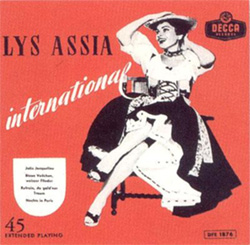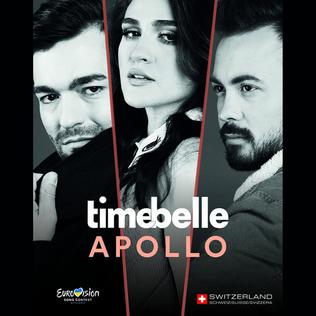
Lys Assia was a Swiss singer who won the first Eurovision Song Contest in 1956. Assia was born in Rupperswil, Aargau, and began her stage career as a dancer, but changed to singing in 1940 after successfully standing in for a female singer.

Switzerland has participated in the Eurovision Song Contest 61 times since making its debut at the first contest in 1956, missing only four contests, in 1995, 1999, 2001 and 2003. Switzerland hosted the first contest in 1956 in Lugano, and won it. Switzerland won the contest again in 1988, with the 1989 contest being held in Lausanne.

"La det swinge" is a Norwegian-language song by the pop duo Bobbysocks!. It was the winner of the Eurovision Song Contest 1985, Norway's first victory in the contest.

Denmark has participated in the Eurovision Song Contest 49 times, making its first appearance in 1957. Having competed in ten consecutive contests until 1966, Denmark was absent for eleven consecutive contests from 1967 to 1977. Since 1978, it has been absent from only four contests. Denmark has won the contest three times: in 1963, 2000 and 2013. The Danish national selection for the contest is the Dansk Melodi Grand Prix.

"Refrain" was the winning song of the Eurovision Song Contest 1956, co-written by Émile Gardaz and Géo Voumard, performed by Lys Assia representing Switzerland. It was the first-ever winner of the Contest, but not the first-ever performance by Switzerland. This apparent anomaly is due to the rules of the 1956 Contest allowing each competing country to be represented by two songs. Assia represented Switzerland singing both songs, and had previously performed "Das alte Karussell" in German.

"Mono I Agapi" was the Cypriot entry in the Eurovision Song Contest 1982, performed in Greek by Anna Vissi. This was Vissi's second Eurovision entry: in 1980 she had represented Greece in The Hague with the song "Autostop", sung together with the group Epikouri, and had then finished 13th.

"Apopse as vrethume" was the Cypriot entry in the Eurovision Song Contest 1989, performed in Greek by Fani Polymeri and Yiannis Savvidakis.

"To diko sou asteri" was the Greek entry in the Eurovision Song Contest 1989, performed in Greek by Mariana.

Emis Forame To Himona Anixiatika was the Greek entry in the Eurovision Song Contest 1996, performed in Greek by Mariana Efstratiou. Efstratiou had previously represented Greece in the 1989 contest in Lausanne with "To Diko Sou Asteri" and composer Kostas Bigalis in turn in Dublin in 1994 with "To Trehandiri".

"Giorgio" was the Swiss entrant to the Eurovision Song Contest 1958, held in Hilversum, the Netherlands. It was performed in German and Italian by Lys Assia, winner of the 1956 contest for Switzerland. It was the first song to be performed in more than one language in the Eurovision Song Contest. The song was composed by Paul Burkhard and Fridolin Tschudi.

"Les illusions de nos vingt ans" is a French-language song by Peter, Sue and Marc that represented Switzerland at the Eurovision Song Contest 1971 in Dublin, Ireland. It was composed by Peter Reber and written by Maurice Tézé.

"Io senza te" is an Italian-language song by Peter, Sue and Marc, which represented Switzerland in the Eurovision Song Contest 1981.

"Djambo, Djambo" is a song by Peter, Sue and Marc that represented Switzerland in the Eurovision Song Contest 1976, composed by Peter Reber. It is one of fourteen Swiss entries in the contest to be sung in English. Peter, Sue & Marc represented Switzerland at the Contest on four separate occasions, each time singing in a different language; in 1971 with "Les illusions de nos vingt ans" in French, in 1976 with "Djambo, Djambo" in English, in 1979 with "Trödler und Co" in German and finally in 1981 with "Io senza te" in Italian, a record in Eurovision history.

"Trödler und Co" was the Swiss entry to the Eurovision Song Contest 1979, performed by Peter, Sue, Marc, Pfuri, Gorps and Kniri. The song was written by Peter Reber of Peter, Sue and Marc in German. An English-language version of the song was entitled "Second Hand Company".
Anita Traversi was a Swiss singer, best known for her participation in the Eurovision Song Contests of 1960 and 1964.
Terttu Anneli Orvokki Saaristo is a Finnish singer and actress, best known internationally for her participation in the 1989 Eurovision Song Contest.
Furbaz are a Swiss vocal group consisting of members Marie Louise Werth, Giusep Quinter, Ursin Defuns and Gion Defuns, who perform mainly in the Romansh language. The group was formed in 1983 in Disentis, Graubünden, remaining active until the early 1990s. They then reunited in 2004, and continue performing together. Furbaz are best known internationally for their participation in the Eurovision Song Contest 1989

Amaury Vassili Chotard is a French opera singer and professional tenor. His debut album Vincerò from 2009 went double platinum in France, and he has had international success with releases in Canada, South Africa and South Korea.
Switzerland was represented by Furbaz, with the song '"Viver senza tei", at the 1989 Eurovision Song Contest, which took place on 6 May in Lausanne, following Celine Dion's victory for Switzerland the previous year. Furbaz was the winner of the Swiss national final for the contest, held on 18 February.

"Apollo" is an English-language song performed by Swiss band Timebelle. The song represented Switzerland in the Eurovision Song Contest 2017. It was written by Elias Näslin, Nicolas Günthardt, and Alessandra Günthardt. The song was released as a digital download on 10 March 2017. The song is about love and devotion to the arts and includes the refrain "I follow you Apollo".
















